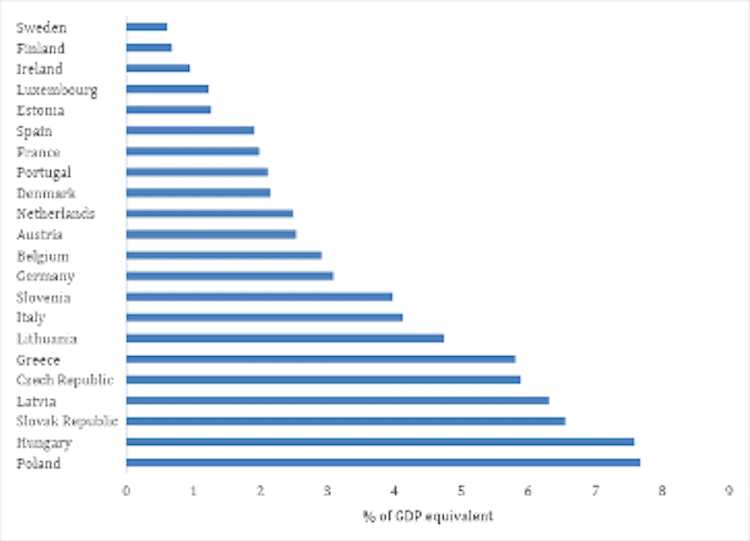The climate blueprints from EU member states are inadequate—and would forgo major socio-economic benefits.

This year, European Union member states were required under EU regulation to update their National Energy and Climate Plans (NECP). These documents should drive the transformation of how Europeans use energy, grow food, move around and manage waste. Yet significant gaps remain, in the process and in terms of targets and measures. Only six member states respected the June deadline for new draft NECP and five—Belgium, Bulgaria, Ireland, Latvia and Poland—have not even submitted their drafts to date.
By downplaying the importance of the NECP and submitting weak plans, EU countries are not only falling well short of the ambition required to address the pressing climate crisis. They are also missing out on the environmental, social and economic benefits of climate action.
Troubling reality
A recent report from Climate Action Network Europe underlined a troubling reality: countries such as Cyprus, Denmark, Finland, Italy and the Netherlands are failing to meet the minimum EU climate and energy requirements for 2030. And although the remaining countries’ targets might look good on paper, their implementation is questionable.
This failure to meet set targets jeopardises the achievement of the EU-wide goal of a 55 per cent reduction in emissions by 2030—a threshold which in itself is insufficient to stay within the 1.5C ceiling on global heating since preindustrial times set in the Paris Agreement. Even within that limit, the world is poised to experience more frequent and severe impacts, such as extreme weather events and rising sea levels.
These effects, once seen as distant possibilities, are now tangible realities, with profound consequences for both people and nature. The effects of inadequate ambition and implementation reverberate throughout society. Weak national plans leave the most vulnerable to suffer most: between 42 and 50 million people in the EU experience energy poverty which means they struggle to keep their home adequately warm.
Scaling up action
We can however still arrest the damage by accelerating the energy transition, directing investments into energy savings and making its production entirely renewable. A forthcoming study from CAN Europe shows that an accelerated transition aligned with the Paris Agreement’s goals, scaling up climate action, would bring socio-economic benefits—in the short and medium as well as long term—to the value for the EU27 of at least €1 trillion by 2030.
These benefits encompass energy-system savings, positive macroeconomic welfare impacts, avoided resource use and improved public health. The societal advantages would be evident across various domains, including green job creation and reskilling and the positive effects on human health of better air and water quality and biodiversity preservation.
A secure energy supply is in any event indispensable for prosperous societies and a resilient, sustainable economy. Shifting to renewable energy sources and prioritising energy efficiency can meanwhile swiftly mitigate the adverse health impacts of air pollution. This transition also has the potential to reduce the price of energy and alleviate energy poverty—especially if accompanied by support for the renovation of homes to improve energy efficiency and building performance, with a focus on low- and middle-income households.
Plans instrumental
The significance of the NECP cannot be overstated in this context. These plans are instrumental in designing climate mitigation and adaptation measures that avoid exacerbating socio-economic inequalities.
EU member states are mandated to outline integrated climate and energy targets in their NECP—but not only that. Policies, measures and funding must back up the targets to ensure implementation. In reality, however, the draft NECP fall short. Additional measures are often absent or lack credibility, funding is inadequate and the socio-economic impacts are frequently overlooked.
The design and implementation of the NECP and these policies might seem daunting but the transition is unavoidable. And the benefits from acting swiftly and determinedly would be interconnected. By improving air quality, for example, the health costs of premature mortality and morbidity due to exposure to air pollution from fossil-fuel combustion could be drastically reduced: their comparative costs as a proportion of gross domestic product range from under 1 per cent in Sweden and Finland to nearly 8 per cent in high-polluting Hungary and Poland (see chart).
Cost of premature mortality and morbidity due to exposure to fine-particulate pollution

Member states have seven months to improve their NECP before the deadline for ‘final plans’ in June 2024. They must urgently seize this opportunity to ensure the socio-economic benefits of accelerated climate action are captured: it represents an investment in social equity and we cannot afford to delay the transformative actions required to secure a sustainable and resilient future for all.
This focus will also be crucial in the debates ahead of the European Parliament elections in June. These will be pivotal if the momentum generated by the European Green Deal in recent years is to be enhanced.
Chiara Martinelli is director of Climate Action Network (CAN) Europe—Europe's leading NGO coalition fighting dangerous climate change. With 200 member organisations active in 40 European countries, CAN Europe represents more than 1,700 NGOs and more than 40 million citizens.
